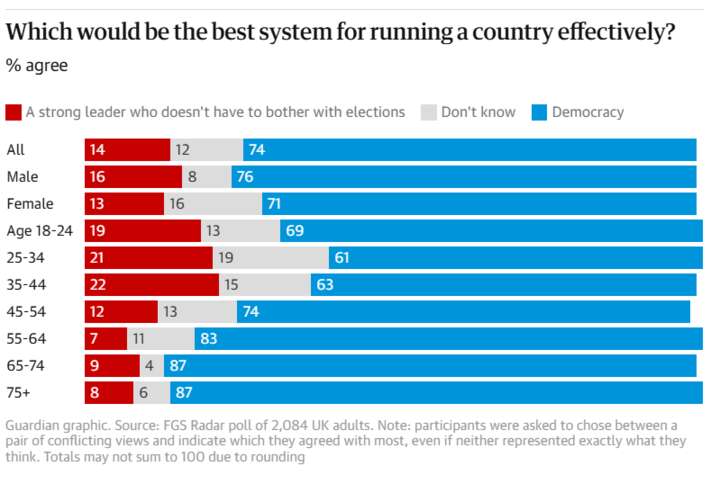
Voters overall are downbeat about politics and almost two-thirds think ‘the UK’s best years are behind us’
One in five generation Z and millennial Britons prefer strong leaders without elections to democracy, and voters overall are feeling downbeat about politics, a report has found.
The polling, due to be published next week as part of the FGS Global Radar report, found that overall 14% of people agreed with the statement: “The best system for running a country effectively is a strong leader who doesn’t have to bother with elections,” rather than the alternative: “The best system for running a country effectively is democracy.”
That rose to 21% of people aged between 18 and 45, who answered that the best system was a strong leader without elections. In contrast, only 8% of people over 55 preferred that system to democracy.

The report’s findings, that a sizeable minority of under-45s are unconvinced by the need for elections, come as some electorates have been opting for populist leaders, such as Donald Trump, through the ballot box, and the billionaire Elon Musk has been wielding power over public debate by shaping what is seen on his social media platform X.
Last week, the FT reported that Musk, who has been appointed by Trump to help overhaul the public sector, had privately discussed with allies how Keir Starmer could be removed as UK prime minister before the next general election, in a move that would constitute an intervention into British democracy.
The FGS report polling found that men were more likely to lean away from democracy than women, at 17% compared with 13%, and Reform UK voters were fractionally more likely to do so than voters for other parties, at 17% compared with Labour voters at 16%, Conservative at 14%, Lib Dem at 9% and Greens at 8%.
Despite last year bringing a Labour landslide, changing the government in the UK, and delivering a second Trump administration in the US, nearly one in four voters said they thought voting did not make a difference. Those most disillusioned with voting were aged 25 to 44, with three in 10 saying it made no difference.
Read more similar news:
Comments:
comments powered by Disqus

































